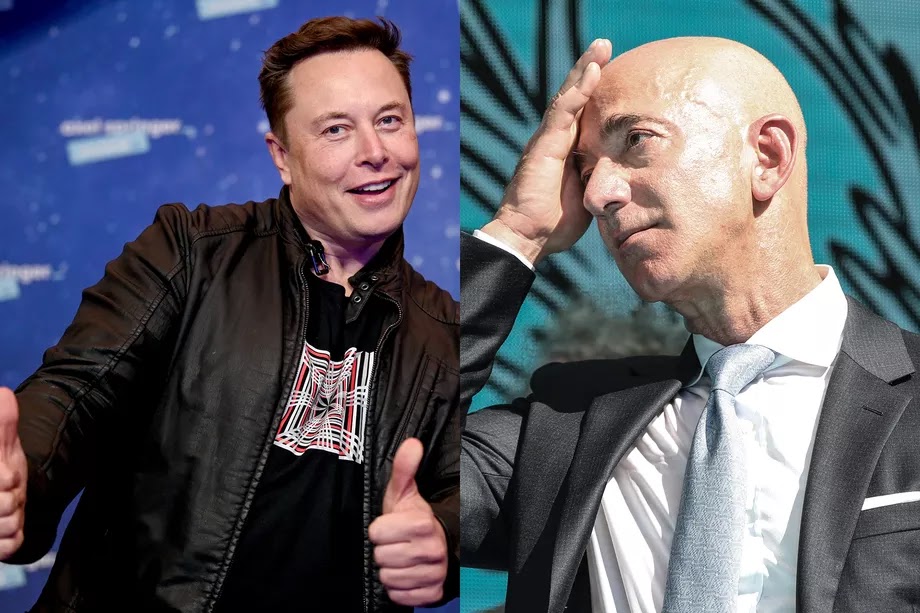The satellite feud between Elon Musk’s SpaceX and Jeff Bezos’ Amazon spilled out into the open on social media this week, after brewing for months in meetings with regulators. It’s only the latest spat in a new race among billionaires for a slice of a $1 trillion telecommunications market.
Elon Musk, CEO of SpaceX, took the war to Twitter on Tuesday, as his company works to persuade FCC officials that it should be allowed to move some of its Starlink satellites to altitudes less than Originally planned.
And “Amazon” affiliated with Jeff Bezos was one of the companies that opposed SpaceX’s request, on the grounds that the amendment would interfere with other satellites.
“It does not serve the public to hamstring Starlink today for an Amazon satellite system that is at best several years away from operation,” Musk tweeted Tuesday, echoing the points made in feisty SpaceX filings posted on Twitter by CNBC reporter Michael Sheetz. In those filings, SpaceX’s director of satellite policy, David Goldman, said “competitors cherry pick data and ignore the true changes in the modification” in order to “reach misleading claims of interference.”
Responding to Musk’s tweet, Amazon released a statement saying: “The facts are simple. We designed the Kuiper System to avoid interference with Starlink, and now SpaceX wants to change the design of its system.”
“Despite what SpaceX posts on Twitter, it is SpaceX’s proposed changes that would hamstring competition among satellite systems,” Amazon said. “It is clearly in SpaceX’s interest to smother competition in the cradle if they can, but it is certainly not in the public’s interest.”
Starlink is SpaceX’s project to build an interconnected Internet of about 12,000 satellites, designed to provide high-speed internet anywhere on the planet.
With more than a thousand satellites in orbit so far, SpaceX began a public pilot program last October.
The price of the initial service is $ 99 per month, in addition to an advance cost of $ 499 for ordering Starlink equipment, which includes a user terminal and a router (Wi-Fi) to connect to satellites.
At the same time, Amazon is working to provide Internet via its own satellite in what is known as the Cuper project. It plans to launch 3,236 internet satellites in low Earth orbit, a system that would rival Starlink; But the company is still in an early stage in the field of manufacturing devices for the antennas, which you need to connect to the network.
And last July, the Federal Communications Commission (FCC) agreed to give a license to Amazon’s Couper project, which the company says will invest more than $ 10 billion in building it.
Musk’s comment comes after SpaceX director David Goldman spoke with FCC officials late last week to discuss the company’s proposal to move some Starlink satellites to lower altitudes.
In a presentation to the FCC, Goldman highlighted that Amazon representatives had held “30 meetings to oppose SpaceX”; But “there are no meetings where she talks about her own system,” and he says that these meetings aim to “stifle competition.”
Amazon representatives spoke with FCC Chairman Ajit Bay last December about a request by SpaceX to amend its Starlink plans.
Amazon asked the FCC to restrict the SpaceX satellites to an altitude of at least 580 kilometers, so that the regulator “assesses the detailed record of significant interference concerns” that Amazon believes is an introduction to the SpaceX modification.
“SpaceX indicated that it was able to operate its system without exceeding 580 km, and did not immediately explain why such a situation was ineffective,” Maria Dodson Schuman, an Amazon consultant, wrote in a letter to the FCC.
The two companies’ satellite networks represent ambitious projects. Like Amazon, SpaceX says its network will cost around $ 10 billion or more.
But SpaceX leadership estimates that Starlink could generate up to $ 30 billion a year or more in annual revenue for its missile business.
SpaceX earlier this month expanded its pilot program, to include customers in the United Kingdom and Canada. The company is looking to expand Starlink’s reach internationally, with public records showing that the company is registered in Austria, Australia, Argentina, Brazil, France, Chile, Colombia, Germany, Greece, Ireland, Italy, Mexico, the Netherlands, New Zealand, the Philippines, South Africa and Spain.


